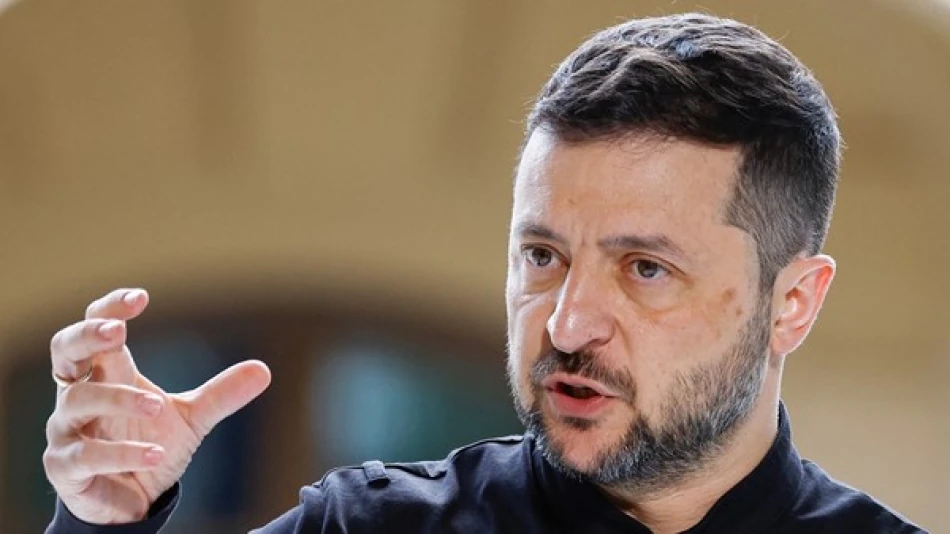
Ukrainian President Urges Accelerated Efforts for Security Guarantees
Zelensky Raises Stakes for Putin Meeting as Ukraine Demands Ironclad Security Guarantees
Ukrainian President Volodymyr Zelensky is intensifying pressure on Western allies to deliver concrete security assurances, making such guarantees a prerequisite for any potential peace talks with Vladimir Putin. The move signals Ukraine's determination to avoid repeating past diplomatic failures while positioning Kyiv to negotiate from a position of strength after more than three years of devastating conflict.
Ukraine's Strategic Pivot Toward Guaranteed Security
Speaking after a meeting with British Chief of General Staff Tony Radakin in Kyiv on Tuesday, Zelensky emphasized the urgent need for clarity on future security arrangements. "We must intensify our work to the maximum and ensure clarity and transparency in everything related to security guarantees," he stated, underscoring that meaningful dialogue with Moscow hinges entirely on obtaining robust international backing.
This approach represents a significant evolution from Ukraine's earlier diplomatic stance. Rather than pursuing talks for their own sake, Zelensky is demanding tangible commitments that would prevent Russia from exploiting any ceasefire to regroup and launch future offensives.
Learning from Historical Diplomatic Failures
The Budapest Memorandum Precedent
Ukraine's insistence on concrete security guarantees reflects hard lessons learned from the 1994 Budapest Memorandum, where Ukraine surrendered its nuclear arsenal in exchange for security assurances from Russia, the United States, and Britain. Those guarantees proved worthless when Russia annexed Crimea in 2014 and launched its full-scale invasion in 2022.
Unlike the vague commitments of the Budapest agreement, Ukraine now seeks legally binding security arrangements with enforcement mechanisms—potentially including NATO Article 5-style mutual defense clauses or permanent military presence from allied nations.
International Implications and Allied Response
Western Allies Face Critical Decision Point
Zelensky's demand places Western allies in a challenging position. Providing the level of security guarantees Ukraine seeks would require unprecedented long-term commitments, potentially including permanent military deployments or binding defense treaties that could draw NATO members into future conflicts with Russia.
The timing is particularly significant as political landscapes shift in key allied nations. Any security framework must be designed to survive potential changes in government priorities and maintain credibility regardless of electoral outcomes in Washington, London, or other capitals.
Strategic Calculations Behind the Ultimatum
By conditioning Putin talks on security guarantees, Ukraine aims to achieve several strategic objectives. First, it ensures that any peace agreement includes mechanisms to prevent future Russian aggression. Second, it forces Western allies to make concrete commitments rather than offering indefinite support without clear parameters.
This approach also strengthens Ukraine's negotiating position by demonstrating that Kyiv won't accept a settlement that merely freezes the current conflict lines without addressing underlying security vulnerabilities. The strategy suggests confidence that Ukraine's battlefield performance and international support provide sufficient leverage to demand meaningful concessions.
Challenges and Realistic Outcomes
The success of Ukraine's strategy depends heavily on allied willingness to provide the requested guarantees. While symbolic security commitments are politically feasible, the binding defense obligations Ukraine likely seeks represent a much higher threshold for international partners already managing complex domestic pressures regarding the conflict's duration and cost.
Nevertheless, Ukraine's position reflects a pragmatic assessment that any peace agreement without credible security arrangements would simply provide Russia with an opportunity to prepare for renewed aggression. This calculation may ultimately prove more palatable to allies than the prospect of indefinite military and financial support for an ongoing conflict.
Most Viewed News

 Layla Al Mansoori
Layla Al Mansoori






